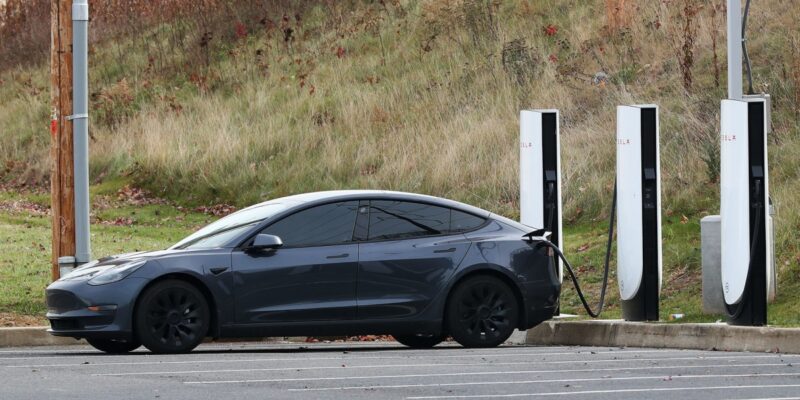
California is already looking to head off any moves by President-elect Donald Trump to slash electric vehicle subsidies — the latest sign of uncertainty for EVs next year that some analysts say prospective buyers should think about now.
“The road ahead in 2025 is looking pretty bumpy for EVs,” said Jay Turner, an environmental studies professor at Wellesley College who studies the market. He called California Gov. Gavin Newsom’s announcement Monday that the state would fill the gap if the incoming administration scraps existing federal EV tax rebates “good news for Californians.”
Some states, including Colorado and Massachusetts, already offer substantial support that EV buyers can combine with those on offer from the federal government, Turner noted. But after California’s own incentives expired last year, the state’s new ultimatum would effectively replace the tax credits (of $7,500 for new EVs and up to $4,000 for used ones) that the Biden administration introduced under the Inflation Reduction Act, should a Republican-controlled White House and Congress quash that aid.
“We’re not turning back on a clean transportation future — we’re going to make it more affordable for people to drive vehicles that don’t pollute,” Newsom, a Democrat, said in a statement Monday.
Trump has criticized tough emissions standards and is likely to renew a fight with California over the matter. He also indicated on the campaign trail that he’d consider eliminating the EV rebates, saying, “Tax credits and tax incentives are not generally a very good thing.”
The Trump transition team didn’t outline specific plans but said he’d be focused on “stopping attacks on gas-powered cars” in his new term. “President Trump will support the auto industry, allowing space for both gas-powered cars AND electric vehicles,” spokeswoman Karoline Leavitt said in a statement.
EV sales are continuing to break records, but uptake this year has been slower than expected, leaving many automakers to temper their plans for the electric transition.
In the meantime, subsidies like those provided under the IRA have helped buoy the market. Year-to-date sales of new EVs reached 1 million units in October, according to Cox Automotive, with incentives comprising at least 13.7% of the average transaction price. Used EV sales were up 63.5% year-to-date, highlighting another problem: Manufacturers are still trying to figure out how many EVs to produce to meet demand without overshooting it, leaving some dealerships with a glut of clean-energy cars.
U.S. automakers want the consumer incentives largely intact, said Ivan Drury, director of insights at Edmunds. But so far, industry experts see “virtually no indication” that Trump and Republican lawmakers want to leave the IRA’s rebate program alone.
“We know that of the options available, the most likely is it’s going away. The only question is how soon, how much and what should you do about it?” Drury said.
The answer could vary by prospective buyers’ locations and budgets, but anyone who’s been eyeing an EV lately should consider acting soon, he said. Even without knowing what the Trump administration and Congress may do, manufacturers will likely produce fewer EVs next year to better sync up with demand, Drury said, which would likely translate into fewer discounts.
And right now, “it’s model-year sell-down time,” he noted. That means buyers can combine existing tax credits with the deep discounts on offer over the next three months. Drury estimated at least 4 out of 5 EVs on dealers’ lots right now are 2024 models.
“If I were a buyer, I’d move before the end of year,” Turner said. Even if the credits aren’t repealed by Congress, the Trump White House “could sharply limit which EVs are eligible for the tax credit through administrative action,” he said, such as tightening rules around foreign battery-sourcing.
One wild card in the next leg of the EV wars: tariffs, which Trump threatened Monday to increase on goods from China, Mexico and Canada on his first day in office, which would likely drive up car prices.
Another question mark surrounds Tesla. The company’s centibillionaire CEO, Elon Musk, played an outsize role in Trump’s re-election campaign and is slated to help run a new “Department of Government Efficiency,” a role that has the potential to pose unparalleled conflicts of interest. Musk has previously called to “take away the subsidies” for EVs, saying, “It will only help Tesla.” The automaker’s stock has soared since Trump’s victory as investors bet on the company benefiting after he takes office.
Hours after Newsom announced his proposal Monday, Bloomberg News reported that his office planned to exclude Teslas from any state rebate program, citing an idea to limit the proposed aid based on automakers’ EV market shares. A spokesperson for the governor’s office told NBC News that “under a potential market cap, and depending on what the cap is, there’s a possibility that Tesla and other automakers could be excluded” but cautioned that the idea “is subject to negotiation with the legislature” and “would be intended to foster market competition.”
Drury said there’s reason to believe Musk is right to envision his company faring comparatively well if the federal credit goes away.
“It’s going to hurt every automaker other than Tesla,” he said. “The tax credit is meant to utilize adoption, to help convince people this is the thing to do.” While rivals are eating into Tesla’s market share, the EV-only automaker still dominates the U.S. market, and the company “doesn’t need that with their customer base right there,” Drury said of the incentive.
For those who might be more risk-averse, he suggests leasing an EV instead.
The current federal tax credit also applies to leases, and some dealerships are exploiting a loophole that allows EV lessees to qualify for the full $7,500 credit without meeting income or manufacturer requirements. In many cases, dealers will apply those savings directly to the term of the lease, Drury said, effectively lowering customers’ monthly payments.
In a recent Edmunds analysis of mid-priced vehicles leased this year, the average monthly payment for EVs when factoring in tax credits was $428, far lower than the $572 for vehicles with gas engines. For a 36-month lease, that’s more than $5,000 in average savings.
“If the tax credit goes away and it’s a significant amount that’s being utilized by dealers, you’ll have them rather upset for a while,” Drury said. “Some will say, ‘Well, good, nobody was buying them.’ But you’re not going to have more happy dealers.”
Buyers who act before any such changes, however, may have reason to smile in retrospect.















